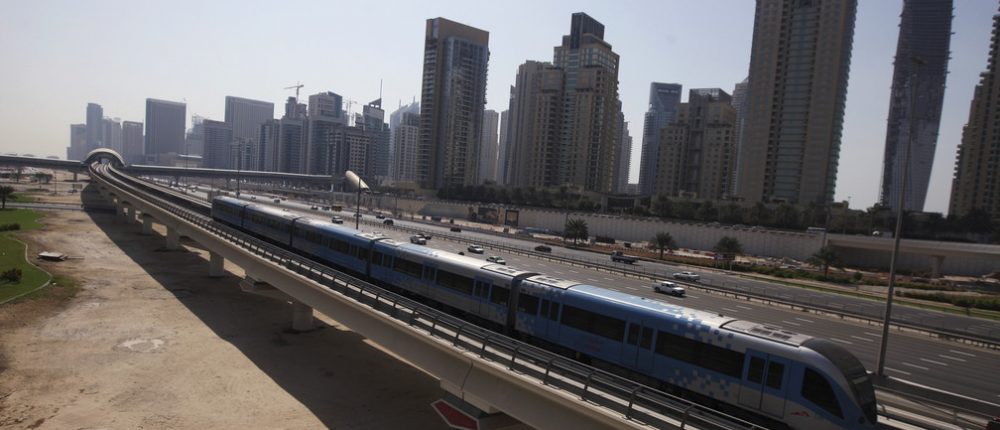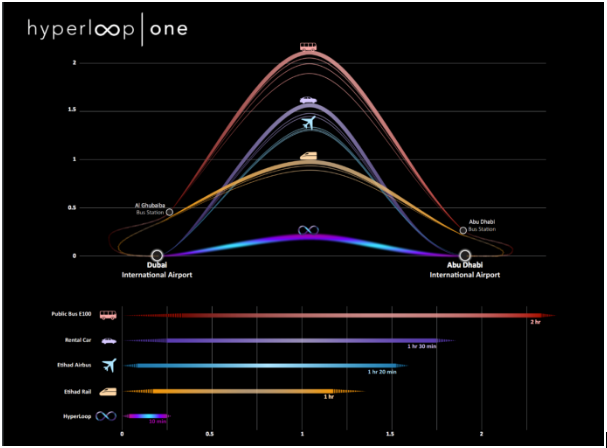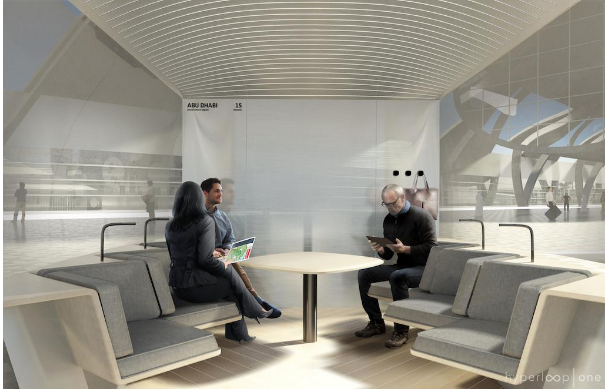Hyperloop in Dubai
Contents |
[edit] Introduction
Humans have long been fascinated with travel. Wherever we are, we want to get somewhere else, and when we’ve got there, we want to be able to get there faster.
Concorde was once the world’s fastest commercial passenger jet, travelling at speeds of over 2,000 km/hour, more than twice the speed of sound. More recently, Japan’s magnetic-levitation bullet train became the world’s fastest train, travelling at speeds of 600 km/h.
Now there is the Hyperloop, a high-speed ground travel system that is tipped to be the world’s next fastest mode of transport.
And cities are taking it seriously. A new project led by US-based company Hyperloop One aims to take people from Dubai to Abu Dhabi in just 12 minutes, a trip that currently takes about two hours.
[Image: Hyperloop One]
[edit] The future of fast travel
On 8 November 2016, Hyperloop One signed an agreement with Dubai’s Roads and Transport Authority (RTA) to explore high-speed routes in the United Arab Emirates “to figure out where and how to build what would likely be a hybrid passenger-freight system in Emirates.”
In other words, it’s going to work out how to turn the theory of Hyperloop into a reality.
“Dubai makes perfect sense for Hyperloop One because this is the 21st century’s global transport hub and its leaders understand that Hyperloop One is ushering in the next era of transportation,” said Shervin Pishevar, Executive Chairman.
[edit] What is it?
Hyperloop One is exploring the idea first floated by SpaceX founder Elon Musk. This is what Hyperloop One thinks its revolutionary transportation system will look like:
In the future, Hyperloop One passengers would board a capsule that travels through giant tubes at 1,200 km/h, using electric propulsion.
'Hyperpods' would seat anywhere from six to 100 people. Businesses could use meeting pods as a moving conference room, and there would even be a critical-care pod to whisk patients to the hospital, according to the company.
[Image: Hyperloop One]
The Hyperloop system would have minimal impact on the environment, and because the vehicle floats slightly above the track, it would be able to travel faster than an airplane. “We eliminate direct emissions, noise, delay, weather concerns and pilot error. It’s the next mode of transportation,” says the company.
Travel between cities would be drastically reduced: Dubai to Abu Dhabi in 12 minutes; Dubai to Doha in 23 minutes; Dubai to Muscat in 27 minutes; and Dubai to Riyadh in 48 minutes.
Here’s what Hyperloop One’s Marvin Ammori had to say when interviewed on the concept at this year’s Annual Meeting of the Global Future Councils in Dubai.
https://www.facebook.com/worldeconomicforum/videos/10153906462661479/
[edit] Will it happen?
It’s a giant leap in terms of technology, and even the founders of Hyperloop One admit that “some engineers knew how to build rockets and cars. Our technology stack doesn’t even exist.” There are also financial and regulatory hurdles ahead, they add.
This recent agreement, however, puts Hyperloop firmly on track.
This article was written by Alex Gray, Senior Writer, Formative Content. It was originally published on the Future of Construction Knowledge Sharing Platform and the WEF Agenda Blog.
[edit] Have you read?
- The hyperloop, passenger drones and other audacious transport breakthroughs
- This is what it might be like to travel in a Hyperloop pod
- 2 hours to 30 minutes. This is what our technology could do to your commute
[edit] Related articles on Designing Buildings Wiki
- 2 hours to 30 minutes. This is what our technology could do to your commute.
- High Speed 2 (HS2).
- Hyperloop One.
- Real estate investment in Dubai.
- The challenges facing Hyperloop One.
- The transport revolution of Hyperloop.
- Top Architectural Wonders of Dubai.
- Transport design and health.
--Future of Construction 14:09, 20 Jun 2017 (BST)
Featured articles and news
ECA support for Gate Safe’s Safe School Gates Campaign.
Core construction skills explained
Preparing for a career in construction.
Retrofitting for resilience with the Leicester Resilience Hub
Community-serving facilities, enhanced as support and essential services for climate-related disruptions.
Some of the articles relating to water, here to browse. Any missing?
Recognisable Gothic characters, designed to dramatically spout water away from buildings.
A case study and a warning to would-be developers
Creating four dwellings... after half a century of doing this job, why, oh why, is it so difficult?
Reform of the fire engineering profession
Fire Engineers Advisory Panel: Authoritative Statement, reactions and next steps.
Restoration and renewal of the Palace of Westminster
A complex project of cultural significance from full decant to EMI, opportunities and a potential a way forward.
Apprenticeships and the responsibility we share
Perspectives from the CIOB President as National Apprentice Week comes to a close.
The first line of defence against rain, wind and snow.
Building Safety recap January, 2026
What we missed at the end of last year, and at the start of this...
National Apprenticeship Week 2026, 9-15 Feb
Shining a light on the positive impacts for businesses, their apprentices and the wider economy alike.
Applications and benefits of acoustic flooring
From commercial to retail.
From solid to sprung and ribbed to raised.
Strengthening industry collaboration in Hong Kong
Hong Kong Institute of Construction and The Chartered Institute of Building sign Memorandum of Understanding.
A detailed description from the experts at Cornish Lime.
IHBC planning for growth with corporate plan development
Grow with the Institute by volunteering and CP25 consultation.
Connecting ambition and action for designers and specifiers.
Electrical skills gap deepens as apprenticeship starts fall despite surging demand says ECA.
Built environment bodies deepen joint action on EDI
B.E.Inclusive initiative agree next phase of joint equity, diversity and inclusion (EDI) action plan.
Recognising culture as key to sustainable economic growth
Creative UK Provocation paper: Culture as Growth Infrastructure.































